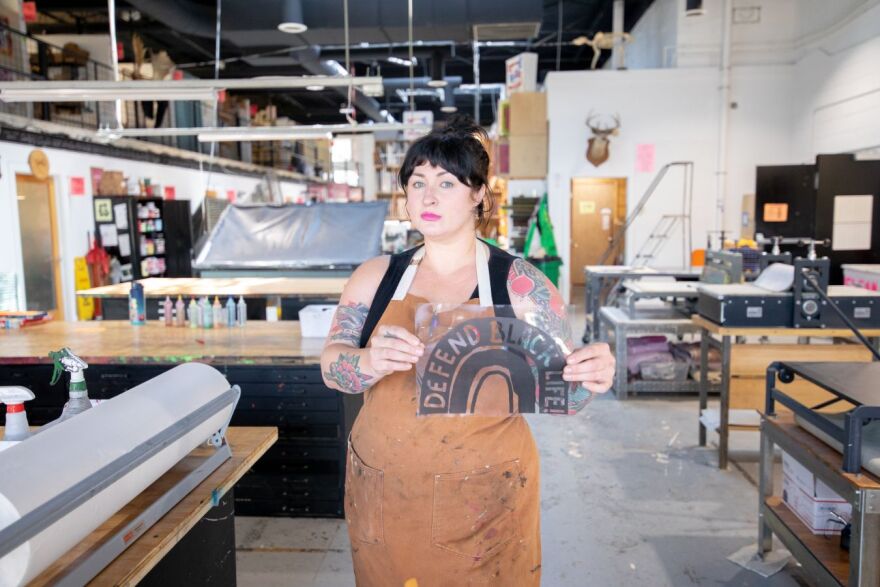It was cold at Studio Two Three on a recent February night.
“Well, I'm feeling the need for that energy efficiency grant here, I decided to keep my coat on,” Dyanna Jaye said to laughs from the room.
Jaye, deputy director at Clean Virginia and a co-founder of the national Sunrise Movement, was part of a panel discussing local climate action with Richmond-area residents. She’s referring to a $200,000 Environmental Protection Agency grant the community art space had been vying for.
“It was very unsexy stuff, you know, HVAC, interior storm windows, new doors that are better insulated,” said Ashley Hawkins, co-founder of Studio Two Three. “But that would have a huge impact on our operating costs every year and make this building much more climate friendly, and sustainable and affordable in the long term.”
Hawkins said the grant appeared to be dead in the water following extensive climate funding freezes and clawbacks implemented by President Donald Trump’s administration. But she said it was hard to confirm whether there was any chance the money will be available.

The confusion over what federal funding remains in play is one challenge to environmental groups, renewable energy developers and others that benefited from grant and loan funding approved by Congress during the administration of President Joe Biden.
The recent meeting served as an opportunity to discuss more than just federal funding, though. Organizer Barry O’Keefe, also a part of Studio Two Three leadership, wanted to make space for ongoing dialogues about the climate and equity-related work that needs to be done in Richmond.
“There are people here tonight feeling, if they felt anything like me, disoriented and demoralized,” O’Keefe said after the event. “We had tables with people doing amazing work, inviting [attendees] into that work, inviting them into joining an organization, inviting them into a community. And I think that’s where the work happens.”
And Richmonders brought their questions.
Ellis Sawyer is a city resident who said food justice is his way into climate action. Sawyer’s worked with Happily Natural, Kinfolk Community RVA and community gardens in town.
Sawyer wanted to know: “What are we doing differently now? How do we move from a point that’s not just … reactionary and responsive to what the [Trump] administration is doing, but how do we maintain the important strides, which, for me, is the equity piece, addressing reparations.”
Sawyer asked the panelists about their concerns. Faith Harris, executive director of Virginia Interfaith Power and Light, said she sees the environmental justice movement as a continuation of the civil rights movement, pointing to a January opinion piece she wrote for the Richmond Free Press.
“I think if all of us would recognize that we have not just a great responsibility, but that we actually have a great benefit from staying involved, I think we can see the change that we all need,” Harris said.
Panelist Michael Smart, who works for the city’s Office of Sustainability, said the department won’t lose its focus on equity.
“Some of our nonprofit friends have been doing this work for so long and have not had that funding background to actually do the work, because they're fighting just to maintain their baseline,” Smart said. “I think also to find strategic ways … to provide opportunities for funding to be a part of the conversation [is important].”
Getting nonprofits connected to funding opportunities has been one of the sustainability office’s main initiatives in implementing Richmond's climate equity action plan. The city didn’t respond to a request for comment on funds being affected by the Trump administration by publication.
One local program that's been insulated from those actions is the Neighborhood Climate Resilience Grant program, which was previously funded by federal dollars but is now stocked with city funds. That program handed out $250,000 this year, including an award enabling Studio Two Three to convert a parking lot connected to its building into a public greenspace.
“I think we can hold out for the next four years. That's what we have to do. We have to resist long enough to make it past the next four years,” Harris said. "And while we're resisting, learning and strategizing, so that when the time comes, that we can make a different decision."



